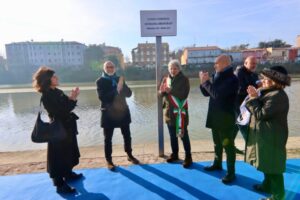CULTURE – Ferrara honors unconventional poetess Giovanna Bemporad
 Both a poetess and a translator, Giovanna Bemporad is a cornerstone of the Italian culture in the 20th century. A hundred years after her birth and a decade since her passing, this brilliant and unconventional; figure, who miraculously survived anti-Jewish persecutions, is making a comeback.
Both a poetess and a translator, Giovanna Bemporad is a cornerstone of the Italian culture in the 20th century. A hundred years after her birth and a decade since her passing, this brilliant and unconventional; figure, who miraculously survived anti-Jewish persecutions, is making a comeback.
Her hometown, Ferrara, honored her with a place of her own: a square in the Nuova Darsena (The New Dock), a recently revitalized area along the Burano Canal. “It is a place between land and sea, poetic par excellence, a place for gatherings and exchange, especially for younger generations,” explained Ferrara’s mayor Alan Fabbri. It is also, he said, “close to the MEIS, the Museum of Italian Judaism and the Shoah, so that Giovanna Bemporad’s origins may be honored.”
“She was a brilliant woman, nonconformist and anti-fascist, persecuted during the fascist regime because she was Jewish,” the President of the Institute of Contemporary History of Ferrara Anna Quarzi told Pagine Ebraiche. “Meeting her for an event in town was an emotional experience.” Naming a square after her, Quarzi emphasizes, “best represents the role of toponymy, which is to remember those who positively impacted Italy’s history.”
Born in Ferrara in 1923, Bemporad translated Virgil’s epic poem Aeneid when she was just 13 years old, working at night before going to school. Her life was marked by racial laws and Nazi-fascist persecution, which she miraculously survived. In a testimony, Bemporad recounted being captured by the SS and risk being shot. She was then imprisoned in nearby Rovigo and eventually set free. “They took me to the countryside and put me against a wall, their rifles pointed right at me. It was a cold November night, the month of the dead. A savage rage rose from my body, and I began to scream in German: Why do you want to kill me? You cannot kill poetry!”.
(Photo Municipality of Ferrara)
